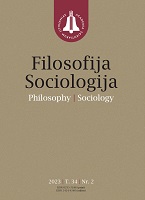The Role of the Kresy Discourse in Constructing the Contemporary Identity of Poles in Lithuania
The Role of the Kresy Discourse in Constructing the Contemporary Identity of Poles in Lithuania
Author(s): Anna Pilarczyk-PalaitisSubject(s): Recent History (1900 till today), Nationalism Studies, Politics and Identity, Identity of Collectives
Published by: Lietuvos mokslų akademijos leidykla
Keywords: Kresy; Kresy myth; Kresy discourse; national identity; Poles in Lithuania; Polishness;
Summary/Abstract: The consequence of establishing new Polish state borders after the Second World War was the mass resettlement of citizens of the pre-war Second Polish Republic (II Rzeczpospolita) from the so-called Kresy – now newly established Lithuanian, Belarusian and Ukrainian republics of the Soviet Union – to the Polish People’s Republic (Polska Rzeczpospolita Ludowa). The 240,000 Poles, who left the Lithuanian Soviet Socialist Republic as part of the post-war resettlement, were only part of a group of over 1.4 million people resettled to ‘new Poland’. With extraordinary strength, they revived the 19th century myth of the Polish Kresy – one of the most important Polish national myths – which soon became an inseparable part of the Polish national discourse and the main element of Polish identity policy towards Poles who stayed in Kresy. This article is an attempt to answer the following question: What is the meaning of and role played by Kresy myth/discourse in constructing the identity of contemporary Poles living in South-eastern Lithuania – on the territory of these mythical Polish Kresy? The article is based on a series of interviews with Poles from Lithuania and representatives of governmental and non-governmental organisations operating for the Kresy, as well as an analysis of the content of these organisations websites with a project offer addressed to Poles in Lithuania.
Journal: Filosofija. Sociologija
- Issue Year: 34/2023
- Issue No: 2
- Page Range: 117-127
- Page Count: 11
- Language: English

